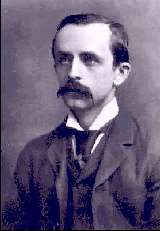
Born: May 9, 1860, in Kirriemuir, Angus, Scotland
Died: June 19, 1937, in London, England
Sir James Matthew Barrie was a Scottish dramatist and novelist. His works frequently portrays life as a romantic adventure. Accordingly, he is most noted for writing Peter Pan, the boy who refused to grow up.
Barrie's father was a poor Scottish weaver, David Barrie. Because his father worked long hours, he was much closer to his mother, Margaret Ogilvy. Throughout Barrie's work, the recurring themes of motherhood and sentiment are felt to be a result of Barrie's relationship with his mother.
Barrie was the youngest son in his family. When he was thirteen, his brother drowned. With the shock of her son's death, Margaret became an invalid and Barrie reputedly tried to replace his brother by lavishing attention on his mother. In 1896, he wrote Margaret Ogilvy for her.
Sensitive about his height of about five feet, Barrie often felt more comfortable talking with children than adults. He was educated at a number of schools operated by his brother, A.O. Barrie. He attended the University of Edinburgh, and obtained a master's degree in 1882.
Barrie worked as a journalist for the Nottingham Journal in 1883. His first literary work was published in the St. James Gazette in 1884. Encouraged by this small success, he moved to London in 1885, where he continued his journalistic endeavors. In 1887, his first published novel, Better Dead, was based on his experiences as a journalist.
Many of the books that followed Better Dead were sentimental tales of Scottish life. For this, Barrie earned a reputation as a leader of the Kailyard School, a derogatory reference reserved for authors that ignore anything harsh or ugly.
Between 1890 and 1900, Barrie began to move away from novels toward plays. In 1894, he married an actress, Mary Ansell. They didn't have any children, and many believe that the marriage wasn't consummated. Barrie's view of women as mothers, not lovers, may have been the cause. This theme is present in many of his works, including the autobiographical novel, Little Tommy. The marriage was unsuccessful and ended in divorce in April 1910.
In 1897, Barrie met the Davis family and quickly befriended the five boys. He read some of the original Peter Pan stories to the children and acted as their guardian after the death of their parents.
In 1893, Barrie collaborated with Sir Arthur Conan Doyle on the Libretto of Jane Annie, but this play lasted only seven weeks. By 1903 he was well known for his drama. Three plays were running in 1903: Quality Street, Little Mary, and The Admirable Crichton. The year 1904 marked the opening of Barrie's most famous work, Peter Pan. Loved by millions of children and adults, Peter Pan has themes of childish innocence and feminine motherhood.
Barrie was made a baronet in 1913 and received the order of merit in 1922. He was awarded honorary degrees from Edinburgh, St. Andrews, Oxford, and Cambridge universities. In 1930, he was named the chancellor of the University of Edinburgh. He died in 1937 and was buried next to his mother and his brother David in Kirriemuir.